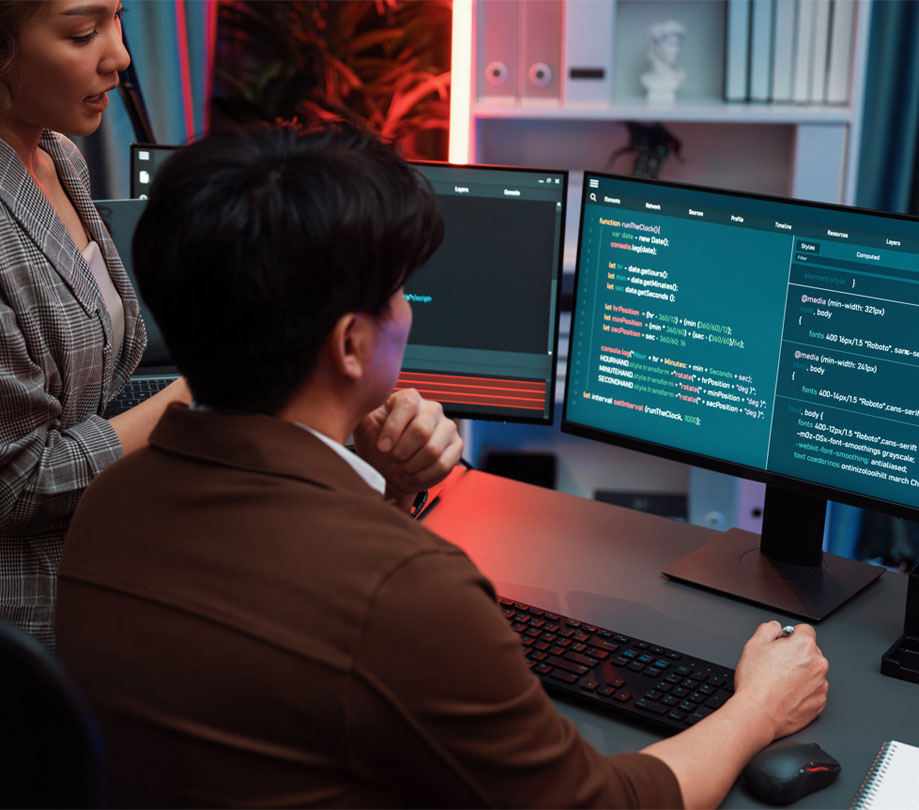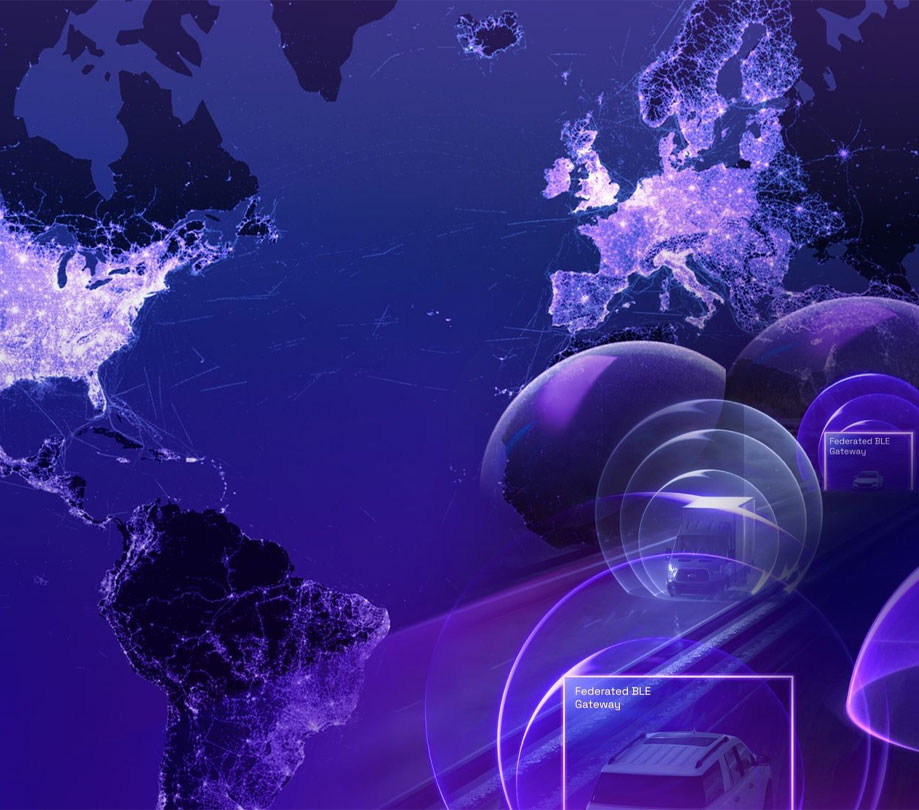Blockchain
Developing on blockchain needs to become easier
Wednesday, January 10, 2018

|
Richard Harris |
Blockchain's inability to scale is at a tipping point and may hinder it's progress in the future as the technology begins to mature into an industry.
As we enter 2018 and the blockchain industry continues to boom, widespread adoption of the technology behind bitcoin is on everyone's mind. However, some believe that as long as transactions occur on-chain, blockchain technology will never overcome the scalability problem that has kneecapped its pursuit of mainstream adoption.
We recently sat with Emin Mahrt, COO of aeternity, and Marion Vogel, Director at aeternity, the open-source, distributed computing platform that builds on decentralized cryptographic P2P technology, to discuss this and more in an exclusive interview with App Developer Magazine.
Emin: In 2017 blockchain technology experienced an unforeseen boom, and thousands of young and senior talents rushed into the space.
Blockchain technology, still in its early days, is starting to mature and is not solely associated with Bitcoin anymore, and we can see that more and more people have started realizing the advantages of decentralized systems and applications.
Engineering creativity is flowing into the nascent industry in the form of original ideas about how blockchain technology can be improved and scaled. The spirit of exploration is high, and we're thrilled to be part of this global problem-solving exercise that will change the world we live in.
Marion: For people who are primarily focused on blockchain projects and involved in the crypto-space, it feels like the total number of projects and competitors are growing on a daily basis. Nevertheless, it is important to stay level-headed and not forget the bigger picture, including the world economy.
Blockchain technology and its potential use-cases are at the very beginning of their development, and the market will most definitely continue to grow exponentially in the coming decades.

Emin: Understanding the advantages of blockchain technology, existing companies should adopt it for the vast efficiency gains. The best use cases of blockchain will be realized as soon as more and more companies begin to understand the advantages of blockchain systems and inevitably some will be forced to do so by their competitors.
Marion: I personally think that not every company should, or actually needs to, adopt blockchain technology. Education must come first, which means a company should do its homework and learn about the technology's core functionalities and potential. If afterwards they are able to transfer processes that will be better handled by a blockchain, then adoption might be a good idea.
Blockchain technology is not a technological panacea, as generally presented these days. When it comes to cutting off certain trust-facilitator roles, as we see in trade-finance business for example or the establishment of highly efficient and trustless fintech-applications, adoption might be quite appropriate.
Moreover, I can actually see whole new types of business-models that blockchain will enable. Decentralized applications with decentralized workforces of hundreds of people worldwide could create a new AirBnB, a new Uber, a new Booking.com, and even a new Amazon. Applications that we currently cannot think of will also appear, as was the case with the internet. Already established, slow moving companies will have a hard time adapting to or adopting blockchain technology. Implementing this type of tech currently requires making high-risk decisions which could potentially disrupt their very own legacy business model.
Emin: Yes, it needs to become much easier for developers and much more native and convenient for users to develop, interact, and use blockchain applications and technology. Widespread adoption of any new technology always comes with improved accessibility for developers and users, and to date, essential tools are still needed right from the very beginning of project development.
The big-bang will happen when users don't even realize that blockchain technology is powering their favorite app and that very same app provides functionalities and features, such as decentralized user structure, governance, privacy and trust, that no other app could enable before that.
Marion: You want to reach a critical mass of developers and users for any p2p, public, open-source platform. On the technical side, it’s important that every blockchain project puts a heavy emphasis on creating a robust and well-documented code base. Tools that lower the entry barrier for developers are necessary, as are educational materials.
Speaking of a wider adoption of users, it is important to lower the entry barrier for less tech-savvy people. It is of utmost importance to create tools and applications that are intuitive and add value for the daily user.

At aeternity we are working towards realizing this goal through our æpp development team. They focus on building applications such as the identity manager that allows users to authorize other apps or revoke the access of apps to their personal information. Have you ever checked how many different applications your Facebook profile is connected to? I recently did, and shockingly 64 applications had access to my Facebook identity. I don't even remember the purpose of some of them. I am confident that personal data protection and use by big companies will slowly move in the focus of the mainstream user. Once people start thinking in that direction, decentralized applications will simply become the norm. Educational materials about how big companies (ab)use your data and how important it is to keep it safe are constantly popping up online. I expect even more of those to appear in the future.
Other than that? Blockchain technology is not in a race. It needs time to mature and sink into the mind of the average user. It is a giant, gathering its strength and building the tools that will allow us to change the world forever.
Emin: A platform that has off-chain channels is one in which transactions that would commonly occur "on-chain" are brought off of it, offering more scalable and private interactions. It's not only transactions and payments but actually "smart contracts" inside these channels. That makes them unique and differentiates them from other projects. We call them "State Channels," and they are an advanced feature of the aeternity blockchain.
In a system that takes transactions off-chain, the main blockchain essentially plays the role of the “court” of the system. As long as all participants agree to the same state, everyone remains happy, and they can do as much business off-chain as they want. If there is a dispute, one can go to the court and enforce the last known state that has been agreed and signed by all participants.
Emin: Scalability and privacy. We can have millions of off-chain channels existing in parallel and providing users with lightning speed communication and value transfer.
Emin: We're at a tipping point. I envision that many participants in the industry will succeed with their ideas and many more will fail. I think that wherever blockchain technology makes sense, blockchain technology will take over. It will also create a new industry with new products that haven't been there before. Public adoption will follow technical exploration. In many areas, we as industry leaders, need to work together and talk to regulators, governments, and companies willing to adopt blockchain technology. The better we educate them, the faster we will find consensus. The next several years will most probably be even more adventurous and exciting. I don't think innovation and adoption will slow down.
Marion: It will continue to be exciting, exhilarating, and we should always expect the unexpected. The more adaptive and flexible one is, the more likely one is to succeed. I think the blockchain industry has already proven to be one of the fastest moving, loudest and most adventurous spheres. Admittedly, sometimes even up to an absurd level. Millions in cryptocurrency gets stolen or locked, there are heated discussions about cryptokitties congesting networks, memes are created about industry leaders, and users are smashing their heads around upcoming hard forks that they do not understand the effect of. All of this is education on a global scale, and valuable lessons are being learned and as a result the community comes together and grows stronger after each dramatic event.
Regulation will intensify. However, I hope the authorities in charge will be open-minded enough to treat this still raw technology as a massive, positive game-changer. I can already notice positive developments in the regulatory sphere in certain jurisdictions in good old Europe.
Apart from a number of failed projects due to bad or missing business models and/or low-quality technology, we will witness the first successful implementations of mainstream blockchain technology. Some of those will come from aeternity.
ADM: What is the current landscape of the blockchain space? How has it evolved since aeternity's inception?
Emin: In 2017 blockchain technology experienced an unforeseen boom, and thousands of young and senior talents rushed into the space.
Blockchain technology, still in its early days, is starting to mature and is not solely associated with Bitcoin anymore, and we can see that more and more people have started realizing the advantages of decentralized systems and applications.
Engineering creativity is flowing into the nascent industry in the form of original ideas about how blockchain technology can be improved and scaled. The spirit of exploration is high, and we're thrilled to be part of this global problem-solving exercise that will change the world we live in.
Marion: For people who are primarily focused on blockchain projects and involved in the crypto-space, it feels like the total number of projects and competitors are growing on a daily basis. Nevertheless, it is important to stay level-headed and not forget the bigger picture, including the world economy.
Blockchain technology and its potential use-cases are at the very beginning of their development, and the market will most definitely continue to grow exponentially in the coming decades.

Emin Mahrt, COO at æternity
ADM: Why should existing companies adopt blockchain technology?
Emin: Understanding the advantages of blockchain technology, existing companies should adopt it for the vast efficiency gains. The best use cases of blockchain will be realized as soon as more and more companies begin to understand the advantages of blockchain systems and inevitably some will be forced to do so by their competitors.
Marion: I personally think that not every company should, or actually needs to, adopt blockchain technology. Education must come first, which means a company should do its homework and learn about the technology's core functionalities and potential. If afterwards they are able to transfer processes that will be better handled by a blockchain, then adoption might be a good idea.
Blockchain technology is not a technological panacea, as generally presented these days. When it comes to cutting off certain trust-facilitator roles, as we see in trade-finance business for example or the establishment of highly efficient and trustless fintech-applications, adoption might be quite appropriate.
Moreover, I can actually see whole new types of business-models that blockchain will enable. Decentralized applications with decentralized workforces of hundreds of people worldwide could create a new AirBnB, a new Uber, a new Booking.com, and even a new Amazon. Applications that we currently cannot think of will also appear, as was the case with the internet. Already established, slow moving companies will have a hard time adapting to or adopting blockchain technology. Implementing this type of tech currently requires making high-risk decisions which could potentially disrupt their very own legacy business model.
ADM: Is there anything that needs to change before blockchain can be widely adopted?
Emin: Yes, it needs to become much easier for developers and much more native and convenient for users to develop, interact, and use blockchain applications and technology. Widespread adoption of any new technology always comes with improved accessibility for developers and users, and to date, essential tools are still needed right from the very beginning of project development.
The big-bang will happen when users don't even realize that blockchain technology is powering their favorite app and that very same app provides functionalities and features, such as decentralized user structure, governance, privacy and trust, that no other app could enable before that.
Marion: You want to reach a critical mass of developers and users for any p2p, public, open-source platform. On the technical side, it’s important that every blockchain project puts a heavy emphasis on creating a robust and well-documented code base. Tools that lower the entry barrier for developers are necessary, as are educational materials.
Speaking of a wider adoption of users, it is important to lower the entry barrier for less tech-savvy people. It is of utmost importance to create tools and applications that are intuitive and add value for the daily user.

Marion Vogel, Director of aeternity
At aeternity we are working towards realizing this goal through our æpp development team. They focus on building applications such as the identity manager that allows users to authorize other apps or revoke the access of apps to their personal information. Have you ever checked how many different applications your Facebook profile is connected to? I recently did, and shockingly 64 applications had access to my Facebook identity. I don't even remember the purpose of some of them. I am confident that personal data protection and use by big companies will slowly move in the focus of the mainstream user. Once people start thinking in that direction, decentralized applications will simply become the norm. Educational materials about how big companies (ab)use your data and how important it is to keep it safe are constantly popping up online. I expect even more of those to appear in the future.
Other than that? Blockchain technology is not in a race. It needs time to mature and sink into the mind of the average user. It is a giant, gathering its strength and building the tools that will allow us to change the world forever.
ADM: What does it mean to take transactions off-chain?
Emin: A platform that has off-chain channels is one in which transactions that would commonly occur "on-chain" are brought off of it, offering more scalable and private interactions. It's not only transactions and payments but actually "smart contracts" inside these channels. That makes them unique and differentiates them from other projects. We call them "State Channels," and they are an advanced feature of the aeternity blockchain.
In a system that takes transactions off-chain, the main blockchain essentially plays the role of the “court” of the system. As long as all participants agree to the same state, everyone remains happy, and they can do as much business off-chain as they want. If there is a dispute, one can go to the court and enforce the last known state that has been agreed and signed by all participants.
ADM: What is the biggest benefit of taking transactions off-chain?
Emin: Scalability and privacy. We can have millions of off-chain channels existing in parallel and providing users with lightning speed communication and value transfer.
ADM: How do you envision the industry changing over the next several years?
Emin: We're at a tipping point. I envision that many participants in the industry will succeed with their ideas and many more will fail. I think that wherever blockchain technology makes sense, blockchain technology will take over. It will also create a new industry with new products that haven't been there before. Public adoption will follow technical exploration. In many areas, we as industry leaders, need to work together and talk to regulators, governments, and companies willing to adopt blockchain technology. The better we educate them, the faster we will find consensus. The next several years will most probably be even more adventurous and exciting. I don't think innovation and adoption will slow down.
Marion: It will continue to be exciting, exhilarating, and we should always expect the unexpected. The more adaptive and flexible one is, the more likely one is to succeed. I think the blockchain industry has already proven to be one of the fastest moving, loudest and most adventurous spheres. Admittedly, sometimes even up to an absurd level. Millions in cryptocurrency gets stolen or locked, there are heated discussions about cryptokitties congesting networks, memes are created about industry leaders, and users are smashing their heads around upcoming hard forks that they do not understand the effect of. All of this is education on a global scale, and valuable lessons are being learned and as a result the community comes together and grows stronger after each dramatic event.
Regulation will intensify. However, I hope the authorities in charge will be open-minded enough to treat this still raw technology as a massive, positive game-changer. I can already notice positive developments in the regulatory sphere in certain jurisdictions in good old Europe.
Apart from a number of failed projects due to bad or missing business models and/or low-quality technology, we will witness the first successful implementations of mainstream blockchain technology. Some of those will come from aeternity.

Become a subscriber of App Developer Magazine for just $5.99 a month and take advantage of all these perks.
MEMBERS GET ACCESS TO
- - Exclusive content from leaders in the industry
- - Q&A articles from industry leaders
- - Tips and tricks from the most successful developers weekly
- - Monthly issues, including all 90+ back-issues since 2012
- - Event discounts and early-bird signups
- - Gain insight from top achievers in the app store
- - Learn what tools to use, what SDK's to use, and more
Subscribe here









